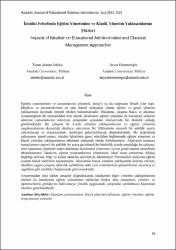| dc.date.accessioned | 2020-07-09T06:23:03Z | |
| dc.date.available | 2020-07-09T06:23:03Z | |
| dc.date.issued | 2015 | en_US |
| dc.identifier.citation | Erkılıç, T. A, Himmetoğlu, B. (2015). İdealist felsefenin eğitim yönetimine ve klasik yönetim yaklaşımlarına etkileri. Anadolu Journal of Educational Sciences International (AJESI), 5 (2), 94-108. | en_US |
| dc.identifier.issn | 2146-4014 | |
| dc.identifier.uri | https://hdl.handle.net/11421/23709 | |
| dc.description.abstract | Eğitim sistemlerinin ve kurumlarının yönetimi, dolaylı ya da doğrudan felsefi izler taşır.
İdealizm ve perennializmin en eski felsefi anlayışlar olarak eğitim ve genel yönetim
yaklaşımları üzerinde önemli etkileri bulunmaktadır. Düşünme, yaşama bakış ve düşünce
sistematiğinin ilk ürünlerinden biri olarak idealizmin eğitim yönetimi ile kurumsal yönetim
sürecine yansımalarını irdeleyen çalışmalar açısından alanyazında bir eksiklik olduğu
görülmektedir. Bu çalışma ile klasik yönetim yaklaşımlarının ve eğitim yönetimi
uygulamalarının dayandığı düşünce sisteminin bir bölümünün sistemli bir şekilde analiz
edilebileceği ve alanyazındaki eksikliğin giderilebileceği düşünülmüştür. Bu doğrultuda
çalışmanın temel amacı, idealist felsefenin genel nitelikleri bağlamında eğitim yönetimi ve
klasik yönetim yaklaşımlarına etkilerini tartışmak olarak belirlenmiştir. Alanyazın taraması
sonuçlarının sistemli bir şekilde bir araya getirilerek bir bütünlük içinde sunulduğu bu çalışma,
nitel araştırma yöntemlerinden doküman incelemesi yöntemini içeren genel tarama modelinde
desenlenmiştir. İdealizm, eğitim programlarının yönetimini; ideal insan yetiştirme, ülküye
bağlılığı artırma, bilgi ve kültür aktarma işlevleriyle etkilemiştir. Perennialist anlayışta eğitim
sistemi klasik nitelikler taşımaktadır. İdealizmin klasik yönetim yaklaşımlar üzerine etkileri;
ideallere uygun çalışma, akılcılık, iş bölümü, ödül ceza sistemlerinin geliştirilmesi, hiyerarşi ve
eşgüdüm gibi nitelikler bağlamında gözlenmektedir.
Araştırmadan elde edilen amaçlar doğrultusunda idealizmin diğer yönetim yaklaşımlarına
etkileri ile idealizmin eğitim yönetimine etkilerine ilişkin alan uzmanları, yönetici ve
öğretmenlerin görüşlerini belirlemeye yönelik uygulamalı çalışmalar yürütülmesi biçiminde
öneriler getirilmektedir. | en_US |
| dc.description.abstract | The discussions on the effect of idealism on education and educational administration are broad;
however, academic studies are limited. In a sense, it can be observed that the literature on
idealism as one of the first outcomes of thinking, perspectives on life and systematic thought is
limited in that there is a lack of studies investigating its reflection on educational administration
and institutional administration processes. Therefore, it is essential to examine the reflections
of idealism on education and educational administration through a scientific and systematic
approach. Accordingly, the main purpose of this study is to discuss the effects of idealist
philosophy on educational administration and classical administration approaches within the
framework of general features of idealist philosophy. The method of this study is document
review. This study has been designed using the general screening model of document review,
which constitutes one type of qualitative research method. The study examined the effects of
idealist philosophy on the administration of curriculum and classical administration approaches,
and presented the literature review in a coherent and systematic manner. According to the
results of the study, idealism has affected the management of curriculum in terms of creating
the ideal person, increasing commitment to the ideal, and conveying culture and knowledge. In
perennialist approach, educational systems have classical characteristic. Idealism has affected
classical management approaches in terms of its main features such as working
for ideals, rationalism, division of labor, reward and punishment systems, hierarchy and
coordination.
The administration of educational systems and institutions has directly or indirectly,
consciously or unconsciously come under the philosophical influences. Idealist philosophy is
effective on the development of society in terms of realizing ideals and improving the mind.
Idealism influences education in the dimensions of curriculum and institutional administration,
as well. Particularly, with its perennialist notion, it provides an intellectual base for the function
of transmitting knowledge and culture by influencing educational systems in the curriculum
dimension. As such, even today, no matter what their purposes are, one of the most important
aims and functions of educational institutions is to transmit knowledge and culture, which, in
other words, means the socialization of masses. In this respect, it is observed that idealist
philosophy and its reflection of perennialist perspective converts education into a classical
structure. | en_US |
| dc.language.iso | tur | en_US |
| dc.publisher | Anadolu Üniversitesi | en_US |
| dc.rights | info:eu-repo/semantics/openAccess | en_US |
| dc.subject | İdealizm | en_US |
| dc.subject | Perennializm | en_US |
| dc.subject | Klasik Yönetim Yaklaşımı | en_US |
| dc.subject | Eğitim Yönetimi | en_US |
| dc.subject | Eğitim Programının Yönetimi | en_US |
| dc.subject | Idealism | en_US |
| dc.subject | Perennialism | en_US |
| dc.subject | Classical Management Approaches | en_US |
| dc.subject | Educational Management | en_US |
| dc.subject | Management of Curriculum | en_US |
| dc.title | İdealist felsefenin eğitim yönetimine ve klasik yönetim yaklaşımlarına etkileri | en_US |
| dc.title.alternative | Impacts of ıdealism on educational administration and classical management approaches | en_US |
| dc.type | article | en_US |
| dc.relation.journal | Anadolu Journal of Educational Sciences International (AJESI) | en_US |
| dc.contributor.department | Anadolu Üniversitesi | en_US |
| dc.identifier.volume | 5 | en_US |
| dc.identifier.issue | 2 | en_US |
| dc.identifier.startpage | 94 | en_US |
| dc.identifier.endpage | 108 | en_US |
| dc.relation.publicationcategory | Makale - Ulusal Hakemli Dergi - Kurum Öğretim Elemanı | en_US |
| dc.contributor.institutionauthor | Erkılıç, Turan Akman | |
| dc.contributor.institutionauthor | Himmetoğlu, Beyza | |


















